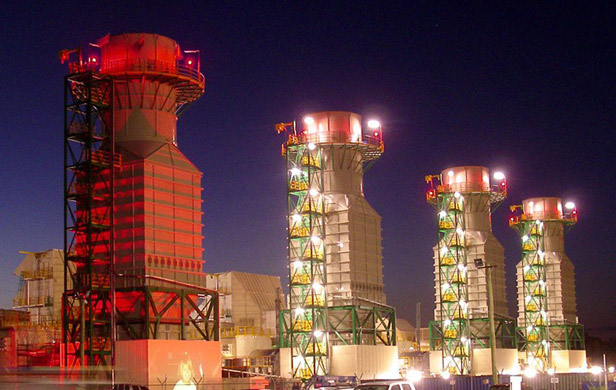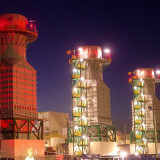
VICTORIA – Like the underground shale gas that Premier Christy Clark says will pave the way to a debt-free future, British Columbia appears caught between a rock and a hard place in balancing its hunger for a burgeoning liquefied natural gas (LNG) industry and meeting its ambitious 2007 greenhouse gas pollution-reduction targets.
Liberals mum on LNG economic, environmental plans
If there is a definitive plan in place, the government isn’t laying it out yet: Natural Gas Development Minister Rich Coleman says the Liberals’ LNG economic plan, which includes a tax structure developed with industry consultation, should be complete within thee next 30 days. It won’t be introduced to the legislature until next year.
Environment Minister Mary Polak says similar LNG environmental negotiations are underway, of which she indicates the options are limited and is refusing to fully elaborate.
But a process of elimination indicates B.C. will rely heavily on carbon offsets to meet its environmental goals.
Offsets in the offing for BC LNG emissions?
That means even if the actual pollution dumped into the atmosphere increases, rather than declines, B.C. will still be able to say the targets have been met because of the discounts offered by requiring industry to financially support environmentally-friendly initiatives to fight global warming.
Still, even if the offsets enable B.C. to claim it has met its pollution targets — targets trumpeted at the time as being among the most stringent in North America — the emissions levels Canada must report to the United Nations will tell a different story.
Those numbers are reported without the discounts of offsets and they are numbers environmentalists predict will rival the emissions of neighbouring Alberta’s oil sands industry. Even without the introduction of LNG plants, environmentalists argue, B.C. is already on its way to missing its legislated targets.
“There are only two ways to reduce emissions, you either actually reduce them or you find means of mitigation and many times that’s through offsets,” said Polak.
“We know many B.C. companies are carbon neutral — Harbour Air for example — but it’s not because they have no emissions. It’s because they purchase offsets.”
Full steam ahead with LNG: 5-7 plants targeted
Besides offsets, the government could reach the targets by taking its foot off the pedal on its ambitious LNG development goals.
That’s clearly not going to happen: Clark’s Liberal government says it wants to build the cleanest LNG industry in the world and continues to repeat election-campaign statements that B.C.’s natural gas will scrub clean China’s coal-darkened skies.
In the beginning, the Liberals pledged three LNG plants: Now, the proposal is for five to seven.
Greenhouse gas reduction targets to be dropped?
The government could back away from the targets committing it to cut greenhouse gas emissions 33 per cent by 2020 — targets created under a different Liberal government, before Clark’s aggressive push towards a liquefied natural gas industry and all the extra emissions it is bound to create.
The government has refused to say it will do that, but it has left the door open.
A government official, on background, says the targets are just that: targets. If they aren’t met, government will simply try harder to meet them next time. Much like balanced budget legislation, the official says, there are no penalties for not meeting the goal.
Environmentalists and noted climate scientists, including Green Party MLA Andrew Weaver and Simon Fraser University’s Mark Jaccard, who both consulted for the Liberals on the climate targets law in 2007, have already repeatedly said the province isn’t going to meet its pollution reduction targets.
”It’s certainly our goal,” says Coleman without committing to actually doing it.
“There may be some challenges around that,” he says in an interview shortly after returning from Asia where he toured an LNG plant in Malaysia and met with executives from Petronas, the Malaysian energy company planning a $36 billion LNG investment near Prince Rupert.
[quote]We’re going to have the highest environmental standards that there are and we’re going to have the cleanest industry that there is in the world as well.[/quote]
Carbon capture in its infancy
A third option to require the industry to explore other emission reduction techniques that could involve storing carbon emissions underground is appealing, but the technology is in its infancy and no one expects B.C. can rely on it in the short-term.
“You could potentially require certain technologies be employed,” says Polak. “You could require certain purchase of offsets, but all of that is subject to negotiations, discussions, in much the same way as having the discussions now with taxation policy.”
So that leaves offsets as the most likely way to allow British Columbia to meet or at least reach for its emission goals.
The challenge is not small.
Report: BC LNG would emit 3x more carbon than plants in other countries
A recent report by Clean Energy Canada, an affiliate of Tides Canada, warned that without B.C. government policy leadership, LNG produced in B.C. could emit more than three-times the carbon produced at other plants around the world.
The B.C. government has not stated publicly what it expects its greenhouse gas emissions to be from the proposed LNG plants. But Clean Energy Canada examined a similar LNG plant under construction in Australia and concluded that B.C. LNG facilities can expect to emit about one tonne of carbon pollution for every tonne of LNG produced.
Clean Energy Canada estimates that will work out to 36 million tonnes of carbon pollution for the initially-proposed three LNG plants in the Kitimat area.
Gas still cleaner than coal?
Prof. James Tansey is a business professor at the University of B.C. who is also the chief executive officer and founder of Vancouver-based Offsetters, a global carbon-management company that helps organizations and individuals understand, reduce and offset their climate impact.
Tansey says the carbon pollution debate in B.C. is focused on legitimate concerns about increased provincial emissions.
But like the government, he notes a global move towards natural gas ultimately reduces GHG emissions worldwide.
Tansey says natural gas is a cleaner energy than oil and coal and has the potential to reduce GHG emissions by 27 per cent (read a Canadian Centre for Policy Alternatives report which argues the contrary).
He says he expects the government to introduce regulations that will require the natural gas companies to purchase the offsets as a cost of doing business in B.C.
Offsets can’t erase real pollution figures
“The companies will have to do it,” said Tansey. “People don’t like offsets in general, but it’s really the only way to say those millions of tonnes of extra emissions from running the LNG facilities can be addressed. If you don’t do that, then they’re going to appear as a black mark on the carbon accounts of the province.”
Offsets may allow B.C. to meet its targets or at least approach them while still reaping the economic benefits of LNG development.
But the actual pollution numbers — without adjustments due to offsets — must be reported to provincial, federal and international climate-change monitoring agencies.
Without LNG, BC making climate progress
Environment Canada’s national inventory submission last April to the United Nations Framework convention on climate change measured a decline of almost six per cent in B.C.’s GHG emissions since 2007, when the province passed its targets law.
The inventory measured B.C.’s carbon dioxide emissions at 59.1 million tonnes in 2011 — the most recent numbers — down from 62.6 million tonnes in 2007. The target for 2020 is about 20.6 million tonnes.
The Environment Canada report stated Canada’s total GHG emissions for 2011 were measured at 702 million tonnes, while Alberta’s GHG emissions were 242 million tonnes.
LNG would ramp up BC’s carbon emissions
Matt Horne, a climate change expert with the Pembina Institute, said he’s certain B.C.’s LNG dreams will increase the province’s GHG emissions well beyond Environment Canada’s most current totals.
“I don’t know where they are going to go with the targets,” he said.
“I haven’t seen any credible projections of how the province is going to meet those targets in particular around the idea of three to five LNG plants being developed. You can’t square that circle.”


Why do people continuously equate Co2 on the same level as other pollutants. Then you hear the line “clean energy from nuclear plants” Really? Then go to Fukishima and breath deeply. Just because you don’t see it, smell it taste it(atleast at the lower yet highly dangerous levels doesn’t mean it isn’t there! Hello? Give me Co2 and green plants to convert it anyday over all the alternatives. Go to any greenhouse and see why they pipe Co2 into them to get healthier plants. Science? Ya the science of BS to create another financial instrument to rob the public called buying carbon credits. Don’t need a doctorate to figure everything that one out. Ah just go back to sleep and let them lead you around by the nose.
I appreciate Common Sense Canadian boxed itself in early embracing . . .
http://www.globalresearch.ca/global-warming-and-the-ideology-of-anthropogenic-human-caused-climate-change/5357415
. . . prematurely the ridiculous AGW scam.
Earth hasn’t warmed for eighteen years: earth’s climate, since time immemorial changes, warm / cool always will! I am surprised CSC hasn’t, so far, displayed the integrity to accept scientific reality . . .
That does not mean CSC must go along with the status quo. For instance why do we tolerate BMW, Jaguar, Lexus intruding upon news events that have nothing to do with luxury yet are insidiously crafted to create a craving.
Government of all stripes has caused the dilemma off-shoring sources of tax revenue and now must make up the short fall pretending we are in a climate crisis.
That doesn’t mean Common Sense Canadian must go along.
Quite the contrary, it must do what it claims and expose the government’s self-inflicted insidious problem for what it is and proffer economically honest and viable ways of making a life free from fear mongering and hysteria!
We’ll have to continue to agree to disagree on AGW, Roger.
Heck, even Danielle Smith has switched camps on this one!
https://commonsensecanadian.ca/wildrose-party-leader-smith-embraces-climate-change/
99% of the offsets purchased from BC’s Pacific Carbon Trust are purchased by the BC Public Sector – that’s taxpayer’s money, taken out of schools, hospitals, universities etc.
Do you think we should take More money out of schools and hospitals, to buy More offsets? Idiotic.
The BC Auditor General has recently exposed this scam. It should be shut down.
Look, if LNG is exported from BC, that means additional CO2 emitted, by the transport ships, which would ship it how many thousand kilometers to Asia.
Using BC natural gas in BC, as a fuel for trucks, buses and cars, would result in less overall CO2 emissions.
This BC usage has the added benefit of replacing gasoline with cleaner, cheaper natural gas.
Nationalize BC natural gas, bring back BC Gas. Provide subsidies to convert vehicles to natural gas. Give BC’ers a good deal on natural gas for auto fuel.
This would be good for people and businesses in BC. Less overall CO2 emissions.
Win-win. LNG export is stupid.